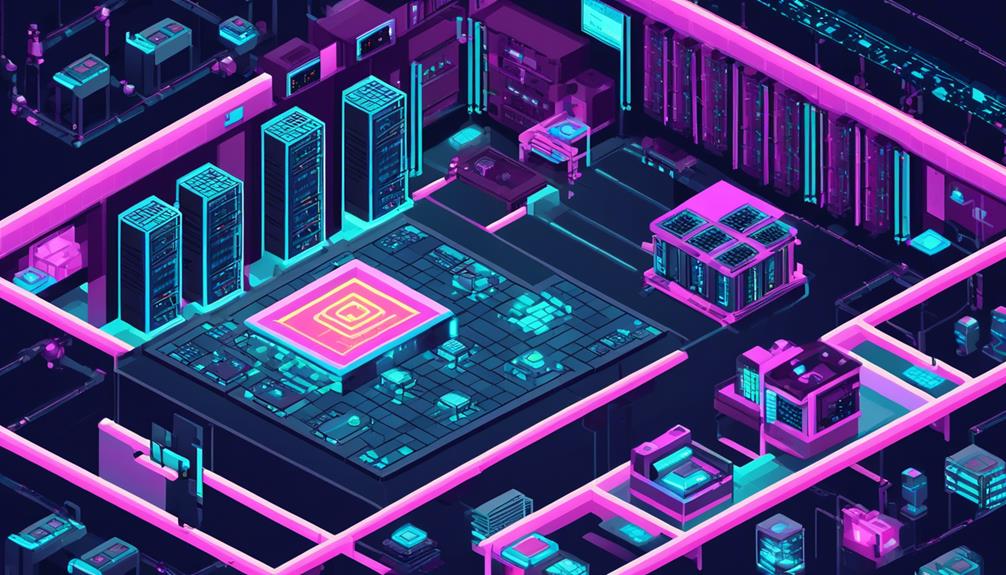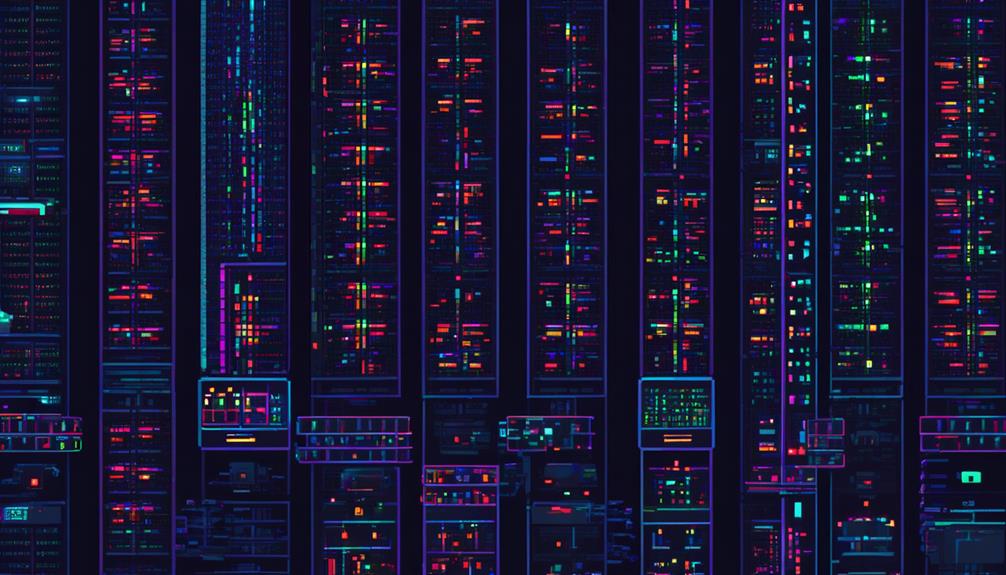In the ever-evolving landscape of data centers, the need for efficient power management has become paramount. With the exponential growth of data and the increasing demand for computational resources, organizations are searching for ways to optimize power consumption and ensure the smooth operation of their data centers.
This is where AI-driven power management comes into play. By harnessing the capabilities of artificial intelligence, data centers can leverage advanced algorithms and techniques to analyze real-time data, fine-tune power allocation, and improve cooling systems. The potential benefits are numerous, from reducing operational costs to enhancing energy efficiency and overall performance.
But what exactly does AI-driven power management entail? How does it work? And what does the future hold for this transformative technology? Join us as we delve into the world of AI-driven power management in data centers, exploring its intricacies, benefits, and future prospects.
Key Takeaways
- AI-powered workload management and resource allocation optimize resource utilization in data centers, ensuring efficient utilization of computing resources and reducing costs associated with overprovisioning.
- Predictive maintenance enabled by AI reduces downtime and maintenance costs, while continuous monitoring and proactive maintenance improve equipment lifespan and minimize service disruptions.
- AI-driven power management in data centers achieves sustainable operations by optimizing energy consumption, identifying opportunities for renewable energy integration, and automating energy management.
- Real-time power monitoring and analysis provided by AI helps data centers achieve unparalleled levels of power management optimization, maximizing energy efficiency, reducing operational costs, and improving system performance.
Ai-Powered Workload Management

Ai-Powered Workload Management optimizes resource allocation and utilization in data centers by leveraging artificial intelligence algorithms. This advanced form of workload management is crucial in addressing the increasing demands of data centers and ensuring efficient power management. With the exponential growth of data processing and complex machine learning algorithms, traditional workload management techniques are no longer sufficient. AI-driven workload management enables data centers to handle massive data processing and support the deployment of AI applications at scale.
One key advantage of AI-driven workload management in data centers is its ability to optimize resource management. By analyzing real-time data, AI algorithms can intelligently allocate resources based on the workload demands. This ensures that resources are utilized efficiently, maximizing the performance and energy efficiency of data centers. Additionally, AI algorithms can predict future workload patterns, allowing for proactive resource allocation and avoiding overprovisioning or underutilization.
Furthermore, AI-powered workload management facilitates predictive maintenance in data centers. By analyzing historical data and detecting patterns, AI algorithms can predict equipment failures and recommend preventative maintenance actions. This reduces downtime and hardware replacement costs, improving the overall reliability and availability of data centers.
In addition to resource optimization and predictive maintenance, AI-driven workload management also helps reduce operational costs. By intelligently managing workloads, data centers can avoid unnecessary resource usage, resulting in cost savings. Moreover, the automation provided by AI algorithms reduces the need for manual intervention and streamlines operations, further reducing operational expenses.
Efficient Power Utilization With AI
Efficient power utilization in data centers can be significantly improved through the integration of AI technologies. AI-driven power management solutions offer several benefits that enhance the overall performance and sustainability of data centers.
- AI-powered workload optimization: AI algorithms can analyze data center workloads and intelligently distribute them across servers, ensuring efficient utilization of computing resources. By dynamically adjusting power allocation based on workload demands, AI can optimize power consumption and reduce energy waste.
- Predictive maintenance: AI algorithms can monitor the health and performance of data center equipment, such as servers, cooling systems, and power distribution units. By analyzing real-time sensor data and historical patterns, AI can predict potential failures or maintenance needs. This proactive approach allows data centers to address issues before they escalate into costly disruptions, improving equipment lifespan and reducing downtime.
- Energy cost optimization: AI can analyze power consumption patterns and identify opportunities for energy savings. By optimizing cooling systems, adjusting power usage during off-peak hours, and identifying energy-intensive applications, AI can help data centers reduce energy costs significantly.
By leveraging AI in data centers, power management becomes more efficient, leading to reduced energy consumption, lower operational costs, and decreased environmental impact. AI algorithms can continuously learn and adapt to changing conditions, ensuring optimal power utilization in real-time. Moreover, AI's data analytics capabilities enable data centers to identify trends, patterns, and anomalies, providing valuable insights for further optimization.
Efficient power utilization is crucial for data centers to minimize their environmental footprint and control operational costs. Integrating AI technologies into power management processes offers data centers the opportunity to achieve these goals effectively.
Enhanced Power Management Through AI

Enhanced power management through AI offers significant benefits in terms of efficiency and smart energy optimization in data centers.
By leveraging machine learning algorithms, real-time power usage can be analyzed and future energy demands can be predicted, leading to cost savings and reduced environmental impact.
Additionally, AI-driven predictive maintenance increases equipment lifespan, reduces downtime and maintenance costs, and contributes to improved operational efficiency and reliability in data center operations.
AI and Efficiency
The implementation of artificial intelligence in data centers revolutionizes power management, optimizing resource allocation and energy consumption for increased efficiency and reduced environmental impact.
AI technology enables data centers to optimize data and workload patterns, leading to improved energy efficiency and operational efficiency.
By utilizing machine learning algorithms, AI can analyze historical data and predict future energy demands, allowing for proactive resource allocation and reducing costs associated with overprovisioning.
Additionally, AI-powered predictive maintenance capabilities can identify potential equipment failures before they occur, minimizing downtime and improving overall operational reliability.
With AI and efficiency go hand in hand, data centers can achieve sustainable operations, reduce energy consumption, and contribute to a greener environment.
Smart Energy Optimization
Utilizing advanced artificial intelligence algorithms, data centers can achieve unparalleled levels of power management optimization through smart energy optimization techniques. By leveraging predictive analytics and real-time data, AI systems can optimize power usage and improve energy efficiency in data center solutions. This not only reduces operational costs but also minimizes the environmental impact of data centers.
To give a visual representation of the benefits of smart energy optimization, consider the following table:
| Benefits of Smart Energy Optimization | |
|---|---|
| Reduced power consumption | Decreased energy costs |
| Optimized resource utilization | Improved energy efficiency |
| Predictive maintenance | Lower maintenance costs |
Through smart energy optimization, data centers can dynamically manage resource allocation, ensuring that power is distributed efficiently based on real-time metrics and historical data. This approach enables data centers to maximize their energy efficiency while minimizing wasted resources and maintenance costs. AI-driven power management in data centers is revolutionizing the industry, providing a sustainable and cost-effective solution for organizations.
Ai-Driven Business Continuity in Data Centers
In the realm of data centers, AI-driven resilience strategies have become a critical component of ensuring uninterrupted operations.
Through the use of AI algorithms, potential equipment failures can be predicted and prevented, minimizing downtime and optimizing continuous uptime.
Furthermore, automated disaster recovery processes enabled by AI streamline the recovery efforts, ensuring business continuity in the face of unexpected events or disasters.
Ai-Driven Resilience Strategies
AI-driven resilience strategies in data centers play a crucial role in ensuring continuous business operations and minimizing downtime during disruptions. These strategies leverage predictive analytics to automate and streamline day-to-day operations and optimize power allocation and rack space, reducing operational costs.
With AI, data center operators can efficiently manage workloads, predict maintenance needs, and allocate resources effectively, ultimately improving service quality and reducing downtime.
Furthermore, AI enhances data center security by detecting anomalies in network traffic and system behavior, enabling proactive security measures and ensuring data integrity.
The integration of AI technologies within data centers, including edge computing for AI workloads, holds immense potential for revolutionizing data center infrastructure, enhancing efficiency, performance, and sustainability.
AI-driven resilience strategies enable data centers to operate with enhanced security and efficiency, ensuring uninterrupted business operations.
Automated Disaster Recovery
Automated Disaster Recovery systems, powered by advanced AI algorithms, ensure rapid and efficient recovery from unexpected disruptions or disasters in data centers. These AI-driven solutions play a crucial role in maintaining business continuity by continuously monitoring data center operations, detecting anomalies, and predicting potential threats.
By analyzing vast amounts of historical data and real-time information, these systems can automatically initiate data backup, replication, and failover processes, reducing downtime and minimizing data loss in the event of a disaster. Additionally, AI models enable real-time decision-making and rapid response, enhancing the resilience and reliability of data centers.
With AI-driven Disaster Recovery solutions, data center security can be strengthened through proactive risk management and quick recovery capabilities, ensuring uninterrupted operations in the face of unforeseen events.
Continuous Uptime Optimization
With the focus on maintaining uninterrupted operations and minimal downtime, Ai-Driven Business Continuity in Data Centers employs continuous optimization techniques to ensure the seamless operation of critical systems. AI continuously analyzes and optimizes power usage, cooling systems, and workload management to maintain uptime.
Predictive maintenance powered by AI identifies potential equipment failures and reduces the risk of downtime disruptions. Additionally, AI enhances data center security by detecting anomalies in network traffic, access logs, and system behavior, bolstering business continuity.
This AI-driven automation in data center operations reduces costs, enhances efficiency, and improves resource management, ensuring continuous uptime optimization.
- AI continuously analyzes and optimizes power usage, cooling systems, and workload management.
- Predictive maintenance powered by AI reduces the risk of equipment failures and downtime disruptions.
- AI enhances data center security by detecting suspicious activity and anomalies in network traffic and system behavior.
Improving Customer Experience With Data Center AI
Data centers leverage the power of AI to enhance customer experience and streamline operations. AI integration in data center operations brings various benefits, including improved efficiency, enhanced security, and optimized resource management. By harnessing AI's capabilities, data centers can minimize equipment failures, reduce costs, and optimize energy consumption.
One way AI improves customer experience is through predictive cooling solutions. By analyzing data on temperature patterns and equipment usage, AI algorithms can predict cooling requirements and adjust cooling systems accordingly. This ensures optimal operating conditions and prevents overheating, which can lead to equipment failures and downtime.
AI also plays a crucial role in enhancing security systems within data centers. Facial recognition technology, powered by deep learning algorithms, can be integrated into access control systems. This allows for accurate and efficient identification of authorized personnel, ensuring only authorized individuals have access to critical areas.
Furthermore, AI-driven anomaly detection enables data centers to identify and respond to potential security breaches or irregularities in real-time. By continuously monitoring network traffic and system logs, AI algorithms can detect abnormal patterns and flag potential threats, allowing for immediate action.
In addition to security, AI helps automate computational tasks in data center operations. This frees up human staff to focus on more strategic objectives, while AI systems handle routine tasks such as data analysis, resource allocation, and power distribution.
Overall, AI integration in data center operations not only improves efficiency and reduces costs but also enhances customer experience by ensuring optimized energy usage, improving security systems, and automating repetitive tasks. The table below summarizes the key benefits of AI in improving customer experience in data centers.
| Key Benefits of AI in Improving Customer Experience |
|---|
| – Predictive cooling solutions |
| – Enhanced security systems |
| – Automated anomaly detection |
| – Efficient computational tasks |
| – Optimized energy usage |
Ai-Optimized Data Center Security

AI-optimized data center security is a critical aspect of safeguarding business-critical operations and protecting against evolving cyber threats. With the increasing complexity and sophistication of cyber attacks, traditional security measures alone are no longer sufficient. AI, combined with machine learning (ML), plays a crucial role in enhancing data center security by detecting anomalies in network traffic, access logs, and system behavior. This enables security teams to analyze data and identify potential breaches before they can cause significant damage.
To emphasize the importance of AI-optimized data center security, the following points can be highlighted:
- AI and ML algorithms enable predictive analysis, allowing data centers to take proactive security measures. By predicting potential threats and vulnerabilities, data centers can implement necessary safeguards to mitigate risks.
- AI-driven security systems improve the overall efficiency of data centers. By automating security processes, data centers can reduce manual efforts and minimize the response time to security incidents.
- AI helps in reducing energy consumption by optimizing power management. By analyzing data and identifying areas for improvement, AI can suggest measures to reduce energy usage without compromising data center performance.
Furthermore, AI-powered detection systems help in real-time monitoring and immediate response to security incidents. By continuously analyzing network traffic, AI can identify suspicious activities and alert security teams, enabling them to take immediate action.
The Future of AI in Data Center Power Management
The future of power management in data centers is poised for transformation through the integration of advanced AI technologies. AI has already proven its capabilities in automating tasks, optimizing resource allocation, and enhancing security in data centers. Now, it is being leveraged to revolutionize power management and address the challenges associated with energy consumption and environmental impact.
One area where AI integration is making a significant impact is in predictive cooling. By analyzing historical data and real-time environmental conditions, AI algorithms can accurately predict cooling requirements and adjust the cooling systems accordingly. This proactive approach not only optimizes energy consumption but also ensures that computing power is efficiently utilized, leading to cost savings and improved operational efficiency.
Furthermore, AI-powered resource allocation can dynamically distribute workloads across servers based on their capacity and performance. This intelligent allocation ensures that computing resources are utilized to their maximum potential, reducing energy waste and improving overall system efficiency.
In addition to optimizing power usage, AI can also take proactive measures to prevent power failures and downtime. By continuously monitoring equipment performance and identifying potential issues, AI algorithms can alert data center operators to take preventive actions, thereby minimizing service disruptions and maximizing uptime.
Moreover, AI is driving the development of sustainable energy optimization strategies in data centers. By analyzing energy consumption patterns and integrating renewable energy sources, AI can help data centers reduce their carbon footprint and contribute to environmental sustainability.
Frequently Asked Questions
How Is AI Used in Data Centers?
AI is extensively used in data centers to optimize various aspects of operations. It enables:
- AI-driven cooling optimization
- Predictive maintenance
- Energy-efficient server allocation
- AI-powered fault detection
- Real-time power consumption monitoring
- Automated workload balancing
- AI-based anomaly detection in power systems
- Intelligent power management algorithms
- Machine learning for optimizing power distribution
- AI-driven power usage prediction.
These applications improve efficiency, reduce downtime, lower operational costs, enhance security, and support the adoption of edge computing for AI workloads in data centers.
How Is AI Used in Power Systems?
AI is used in power systems to optimize power usage, allocation, and efficiency in real time. Through AI-driven predictive maintenance, faults can be detected and mitigated, reducing downtime.
AI also enables automated load balancing and dynamic power provisioning, ensuring optimal resource allocation based on workload demands.
Furthermore, AI-based power consumption analysis and energy consumption forecasting help in optimizing power efficiency.
How Is AI Used for Data Management?
AI is revolutionizing data management in data centers by leveraging AI-powered data analytics and machine learning algorithms. It enables predictive maintenance, automates power allocation, and optimizes energy consumption through real-time power monitoring and load balancing.
AI also plays a vital role in fault detection and mitigation, ensuring uninterrupted operations. Additionally, AI-driven data optimization and energy-efficient data center design enhance overall efficiency and performance.
The integration of AI technologies in data management is transforming data centers into intelligent, efficient, and secure environments.
What Is AI Power Management?
AI power management is a system that utilizes artificial intelligence and machine learning algorithms to optimize power usage in data centers.
It enables energy optimization, improves efficiency, and reduces environmental impact by analyzing real-time data and identifying patterns in power consumption.
AI-based predictive analytics allows for better resource allocation and maintenance planning, leading to increased equipment lifespan.
AI-driven demand response strategies and real-time monitoring of energy usage further contribute to efficient power management.
However, implementing AI power management systems may face challenges, and future trends will likely focus on enhancing AI capabilities and integration.
